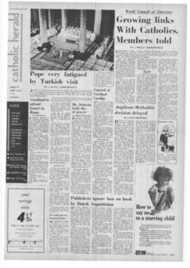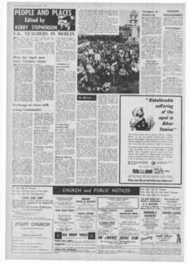Page 4, 4th August 1967
Page 4

Report an error
Noticed an error on this page?If you've noticed an error in this article please click here to report it.
Tags
Share
Related articles
Bishop's Plea For Hong Kong Order
The Red Star In The East
Hong Kong Bishop Hopeful For Future
E Men Who Must Deal With The Dragon
Bishop Of Hm Forces Appointed
Challenge in Hong Kong
Auxiliary Bishop-elect Francis Chen Ping Hsu discusses his appointment with JOHN LUFF
Y appointment has no political significance and is in no manner concerned with our local troubles." said the Rt. Rev, Francis Chen Ping Hsu. the first Auxiliary Bishop elect to the diocese of Hong Kong, when I met him in his office at the Catholic Centre overlooking the waterfront.
Outside, police cars were racing to the offices of a Maoist newspaper which had been turned into an arsenal during the recent riots.
Over the past 17 years the Catholic population of Hong Kong has risen from 30,000 in 1950 to 250,000 in 1967-95 per cent. of that latter figure representing members of the Chinese race. The appointment arises, therefore, out of necessity. "Bishop Bianchi has long needed an assistant" said Fr. Hsu. "M
What was the most challenging aspect of his appointment? "We are living in a mainly non-Christian community. It is my task to state clearly to the Chinese exactly what Catholicism is, and what it stands for.
"In a western community the term 'Catholic' and what it stands for, is generally understood. In Hong Kong it is not understood by the majority of Chinese, who make up our 4 million population."
What was the quality of Chinese Catholicism in relation to the rapid expansion of Catholicism among the Chinese population? He said that as most of the Chinese Catholics were drawn from the excellent Catholic schools the quality was excellent. These young people had broken rigid traditional bonds to become Catholics. And anyone who understood how conservative and binding these ties were would appreciate the material and emotional sacrifices the Chinese Christian convert made.
On the recent political unrest in which the propaganda had taken a chauvinistic slant, Fr. Hsu said that the riots had not affected Catholicism in Hong
Kong. If anything, the vicious personality cult based upon Mao Tse-Tung had strengthened Christian resistance to this neo-paganism.
Fr. Hsu said: "Never has Hong Kong Catholicism 'had it so good.' Given a favourable political climate, we cannot but go on expapding. We are, after all, the only existing missionary toe-hold on the sub-continent of China. The difficulties we face are enormous. The Communists are so well organised right down to village cadres; nevertheless the very growth of Catholicism among the Chinese in Hong Kong is a challenge to Communism."
* * *
I then placed my finger on the sore spot which does exist in Hong Kong in spite of the huge schemes the Government has undertaken to rehabilitate the refugees. I referred of course to those old colonial hangovers which establish a privileged caste. While this is in no sense associated with the actions of the Maoists and the present disturbances, neverthe
less poverty and lack of privileges constitute the atmosphere in which Communism thrives.
Fr. Hsu said: "The Catholic Church has done much in the past in Hong Kong, but it has not done enough. As a Church, we must make a strong stand for social justice. In future, the Catholic Church must go boldly forward for social justice."
Fr. Hsu smiled: "That Is how Pope John pLt it, and he is my hero."
blog comments powered by Disqus









